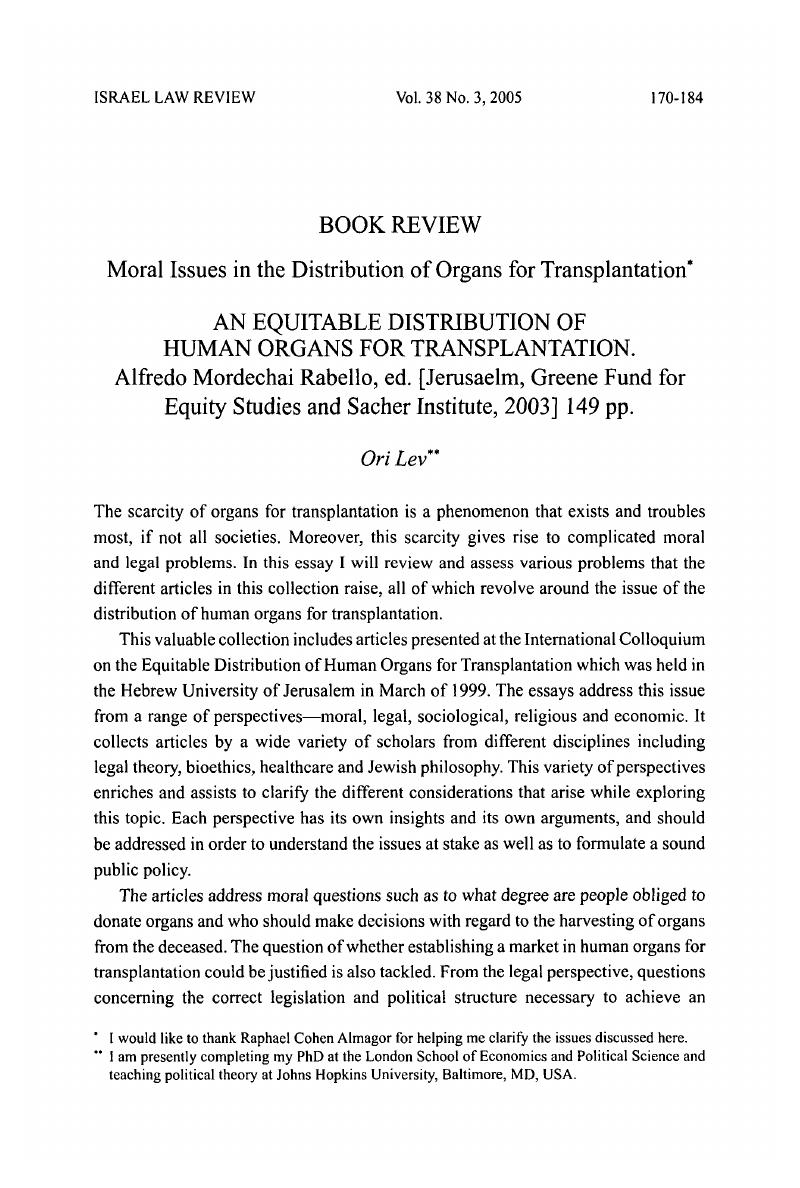No CrossRef data available.
Article contents
Moral Issues in the Distribution of Organs for Transplantation - An Equitable Distribution of Human Organs for Transplantation. Alfredo Mordechai Rabello, ed. [Jerusaelm, Greene Fund for Equity Studies and Sacher Institute, 2003] 149 pp.
Published online by Cambridge University Press: 04 July 2014
Abstract

- Type
- Book Review
- Information
- Copyright
- Copyright © Cambridge University Press and The Faculty of Law, The Hebrew University of Jerusalem 2005
Footnotes
I am presently completing my PhD at the London School of Economics and Political Science and teaching political theory at Johns Hopkins University, Baltimore, MD, USA.
References
1 Mazzoni, Cosimo Marco, “Generosity and Solidarity in the Gift of Organs” in Rabello, Alfredo Mordechai, ed. An Equitable Distribution of Human Organs for Transplantations (Jerusalem, Greene Fund for Equity Studies, and Sacher Institute 2003) 5–10 Google Scholar; Giorgio Resta, “Organ Transplantation and the Role of Law: Some Preliminary Remarks” in Alfredo Mordechai Rabello, ibid., at 13-29; Michael H. Shapiro, “On the Possibility of ‘Progress’ in Managing Biomedical Technologies: Markets, Lotteries, and Rational Moral Standards in Organ Transplantation” in Alfredo Mordechai Rabello, ibid., at 31-96.
2 This view underpins liberal and libertarian moral and political theory. Kant, Locke, Mill, Rawls and Nozick hold that individuals should decide for themselves how to use their body. This principle is usually justified on the grounds that such control is essential for maintaining a person's dignity.
3 Rhodes, Rosamund, “Organ Transplantation” in Kuhse, Helga and Singer, Peter, eds. A Companion to Bioethics (Oxford, Blackwell Publishers, 1998) 329, at 330 Google Scholar.
4 Shabtai A Rappoport, “Sale of Organs from a Living Donor for Transplant: Motivation and Decision-Making” in Alfredo Mordechai Rabello, supra n. 1, at 97-108; Samuel Jellinek, “Future Market: The Sale of Human Body Parts” in Alfredo Mordechai Rabello, supra n. 1, at 137-149.
5 Shapiro, supra n. 1, at 31-96.
6 Ibid., at 40.
7 Ibid., at 53.
8 See Rhodes, supra n. 3, at 331.
9 Amos Shapira, “Organ Transplantation in Israel: Professional Paternalism, Communitarian Solidarity, Individual Autonomy, and Family Control” in Alfredo Mordechai Rabello, supra n. 1, at 125-136.
10 This issue is also addressed by Boddington, Paula, “Organ Donation After Death—Should I Decide, or Should My Family?” (1998) 15(1) Journal of Applied Philosophy 69, at 81 CrossRefGoogle Scholar.
11 Rawls, Scanlon and Barry, to name a few, argue that hypothetical consent is required if government actions are to be considered legitimate. Hypothetical consent is usually required on issues pertaining to justice. Saving lives and even elevating suffering seems to be issues that pertain to justice thereby real consent is not morally warranted. Rawls, John, A Theory of Justice — Revised Edition (Cambridge, Mass, Harvard University Press, 1999)Google Scholar; Scanlon, Thomas, “Contractualism and Utilitarianism” in Sen, Amartya and Williams, Bernard, eds. Utilitarianism and Beyond (Cambridge, Cambridge University Press, 1982) 103, at 128 Google Scholar; Barry, Brian, Justice as Impartiality (Oxford, Clarendon Press, 1995)Google Scholar.
12 Daniel Sinclair, “Organ Transplants in Jewish Law: Traditional Doctrine and Modern Policy” in Alfredo Mordechai Rabello, supra n. 1, at 109-124.
13 As suggested already, in the event the state harvested organs from the deceased there might not be a need for a market. This would occur if the number of organs harvested from the dead was enough to curtail the shortage. An empiric investigation is required to determine whether this would be the case.
14 See Shapiro, supra n. 1, at 83.
15 Samuel Jellinek, “Future Market: The Sale of Human Body Parts” in Alfredo Mordechai Rabello, supra n. 1, at 137-149.
16 Ibid., at 137.
17 For more criticism of the market see: Kahn, Jeffrey P., “Three Views of Organ Procurement Policy: Moving Ahead or Giving Up?” (2003) 13(1) Kennedy Institute of Ethics Journal 45 CrossRefGoogle ScholarPubMed.
18 See Jellinek, supra n. 15, at 139-140.
19 Audi, Robert, “The Morality and Utility of Organ Transplantation” (1996) 8(2) Utilitas 141–158 CrossRefGoogle Scholar; For a communitarian view on our obligation to donate organs see Loewy, Erich H., “Of Community, Organs and Obligations: Routine Salvage with a Twist” (1996) 17(1) Theoretical Medicine 61–74 CrossRefGoogle ScholarPubMed.
20 See Rappoport, supra n. 4, at 97-108.
21 Cosimo Marco Mazzoni, “Generosity and Solidarity in the Gift of Organs” in Alfredo Mordechai Rabello, supra n. 1, at 5-10.
22 For illustration and criticism of luck-egalitarianism see Anderson, Elizabeth, “What is the Point of Equality?” (1999) 109(2) Ethics 287–337 CrossRefGoogle Scholar.
23 This example comes from Cohen, G.A., “Self-Ownership, World-Ownership, and Equality” in Lucash, F. S., ed. Justice and Equality Here and Now (New York, Cornell University Press, 1986) at 111 Google Scholar. John Harris raises the possibility to kill one person in order to save at least two other persons. This he suggests could be justified on Utilitarian grounds. See Harris, John, “The Survival Lottery” (1975) 50 Philosophy 81–87 CrossRefGoogle ScholarPubMed.
24 Ahmed Eid, “An Equitable Distribution of Human Organs for Transplantation” in Alfredo Mordechai Rabello, supra n. 1, at 11-12.
25 Giorgio Resta, “Organ Transplantation and the Role of Law: Some Preliminary Remarks” in Alfredo Mordechai Rabello, supra n. 1, at 13-30.




